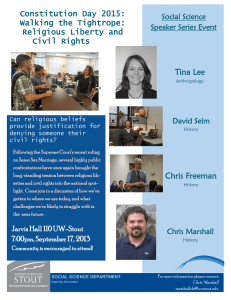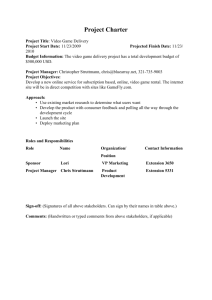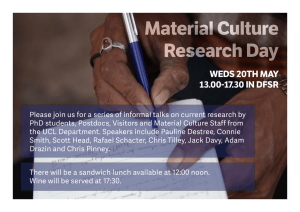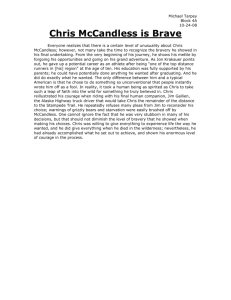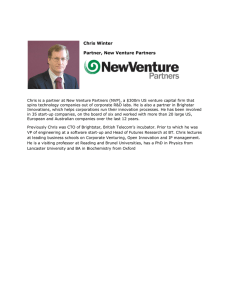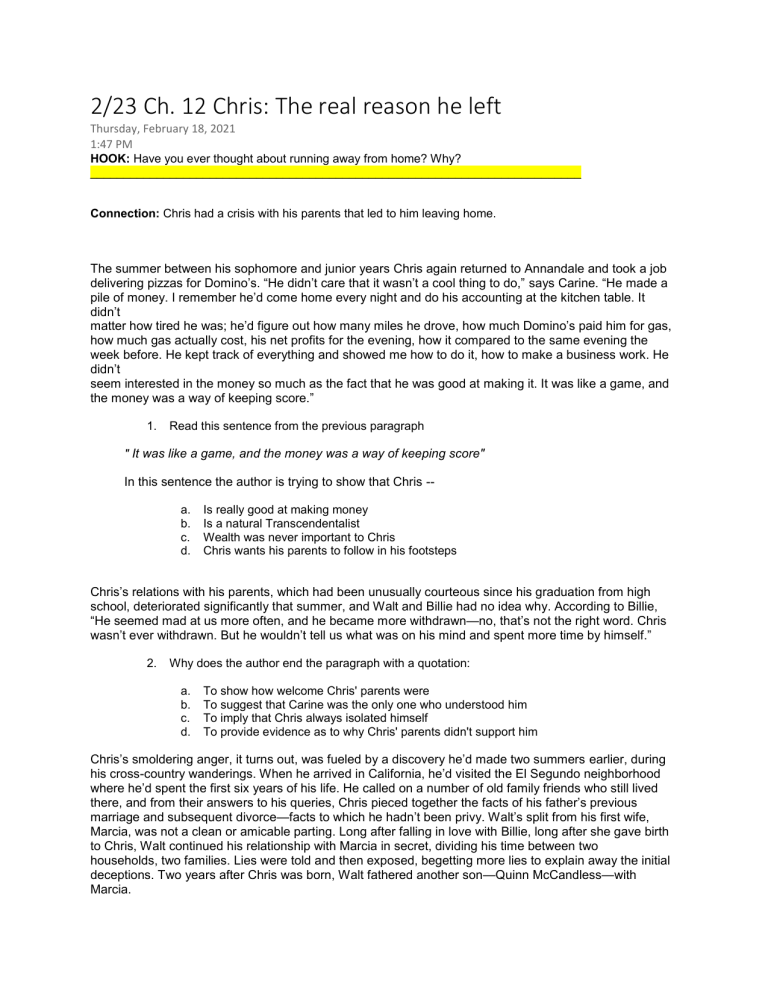
2/23 Ch. 12 Chris: The real reason he left Thursday, February 18, 2021 1:47 PM HOOK: Have you ever thought about running away from home? Why? __________________________________________________________________________ Connection: Chris had a crisis with his parents that led to him leaving home. The summer between his sophomore and junior years Chris again returned to Annandale and took a job delivering pizzas for Domino’s. “He didn’t care that it wasn’t a cool thing to do,” says Carine. “He made a pile of money. I remember he’d come home every night and do his accounting at the kitchen table. It didn’t matter how tired he was; he’d figure out how many miles he drove, how much Domino’s paid him for gas, how much gas actually cost, his net profits for the evening, how it compared to the same evening the week before. He kept track of everything and showed me how to do it, how to make a business work. He didn’t seem interested in the money so much as the fact that he was good at making it. It was like a game, and the money was a way of keeping score.” 1. Read this sentence from the previous paragraph " It was like a game, and the money was a way of keeping score" In this sentence the author is trying to show that Chris -a. b. c. d. Is really good at making money Is a natural Transcendentalist Wealth was never important to Chris Chris wants his parents to follow in his footsteps Chris’s relations with his parents, which had been unusually courteous since his graduation from high school, deteriorated significantly that summer, and Walt and Billie had no idea why. According to Billie, “He seemed mad at us more often, and he became more withdrawn—no, that’s not the right word. Chris wasn’t ever withdrawn. But he wouldn’t tell us what was on his mind and spent more time by himself.” 2. Why does the author end the paragraph with a quotation: a. b. c. d. To show how welcome Chris' parents were To suggest that Carine was the only one who understood him To imply that Chris always isolated himself To provide evidence as to why Chris' parents didn't support him Chris’s smoldering anger, it turns out, was fueled by a discovery he’d made two summers earlier, during his cross-country wanderings. When he arrived in California, he’d visited the El Segundo neighborhood where he’d spent the first six years of his life. He called on a number of old family friends who still lived there, and from their answers to his queries, Chris pieced together the facts of his father’s previous marriage and subsequent divorce—facts to which he hadn’t been privy. Walt’s split from his first wife, Marcia, was not a clean or amicable parting. Long after falling in love with Billie, long after she gave birth to Chris, Walt continued his relationship with Marcia in secret, dividing his time between two households, two families. Lies were told and then exposed, begetting more lies to explain away the initial deceptions. Two years after Chris was born, Walt fathered another son—Quinn McCandless—with Marcia. When Walt’s double life came to light, the revelations inflicted deep wounds. All parties suffered terribly. What did Chris discover? Chris discovered _______________. According to the author, Chris had a mid-life crisis because he -a. He felt lied to his entire life b. His financial stability was taken for granted c. He decided to follow in his sister's footsteps d. He wanted to break away from his second family Eventually, Walt, Billie, Chris, and Carine moved to the East Coast. The divorce from Marcia was at long last finalized, allowing Walt and Billie to legalize their marriage. They all put the turmoil behind them as best they could and carried on with their lives. Two decades went by. Wisdom accrued. The guilt and hurt and jealous fury receded into the distant past; it appeared that the storm had been weathered. And then in 1986, Chris drove out to El Segundo, made the rounds of the old neighborhood, and learned about the episode in all its painful detail. “Chris was the sort of person who brooded about things,” Carine observes. “If something bothered him, he wouldn’t come right out and say it. He’d keep it to himself, harboring his resentment, letting the bad feelings build and build.” That seems to be what happened following the discoveries he made in El Segundo. Children can be harsh judges when it comes to their parents, disinclined to grant clemency, and this was especially true in Chris’s case. More even than most teens, he tended to see things in black and white. He measured himself and those around him by an impossibly rigorous moral code. (RED) Read this sentence from the previous paragraph. "He measured himself and those around him by an impossibly rigorous moral code." In this sentence, the author admits -a. b. c. d. That Chris was extremely intelligent That Chris was a religious scholar That Chris wanted to be like Thoreau That Chris has illusory expectations of everyone around him (BLUE) Read this sentence from the previous paragraph "More even than most teens, he tended to see things in black and white." In this sentence, the author admits -a. b. c. d. Chris had a judgmental view of the world Chris only understood the bad things in life Chris saw the perspective of the world only through Thoreau's eyes Chris wanted to use any excuse to hurt others According to this passage, explain Chris' beliefs in 1 sentence. Chris believed _________________________________. Curiously, Chris didn’t hold everyone to the same exacting standards. One of the individuals he professed to admire greatly over the last two years of his life was a heavy drinker and incorrigible philanderer who regularly beat up his girlfriends. Chris was well aware of this man’s faults yet managed to forgive them. He was also able to forgive, or overlook, the shortcomings of his literary heroes: Jack London was a notorious drunk; Tolsto despite his famous advocacy of celibacy, had been an enthusiastic sexual adventurer as young man and went on to father at least thirteen children, some of whom were conceived at the same time the censorious count was thundering in print against the evils of sex. Like many people, Chris apparently judged artists and close friends by their work, not their life, yet he was temperamentally in capable of extending such lenity to his father. Whenever Walt McCandless, in his stern fashion, would dispense a fatherly admonishment to Chris, Carine, or their half siblings, Chris would fixate on his father’s own less than sterling behavior many years earlier and silently denounce him as a sanctimonious hypocrite. Chris kept careful score. And over time he worked himself into a choler of self-righteous indignation that was impossible to keep bottled up. Which line demonstrates that Chris himself was hypocritical? a. b. c. d. "More even than most teens, he tended to see things in black and white." "One of the individuals he professed to admire greatly over the last two years of his life was a heavy drinker and incorrigible philanderer who regularly beat up his girlfriends" "Chris was well aware of this man’s faults yet managed to forgive them" "Jack London was a notorious drunk; Tolsto despite his famous advocacy of celibacy, had been an enthusiastic sexual adventurer as young man and went on to father at least thirteen children, some of whom were conceived at the same time the censorious count was thundering in print against the evils of sex" Explain the juxtaposition present in the previous passage. Chris judged _________________, while Chris forgave ________________________. WE'RE GOING TO WATCH THE TED TALK OF HIS SISTER: CARINE MCCANDLESS Your DNA Does Not Define You | Carine McCandless | TEDxEmory >>As we're watching the TED TALK, fill out the FORMS attached answering the questions. << From <https://pdf4pro.com/vendor/pdfjs-1.9.426/web/viewer-darkblue.html?file=https%3A%2F%2Fpdf4pro.com%2Fcdn%2Finto-the-wild-metropolitan-college-3c1358.pdf>

